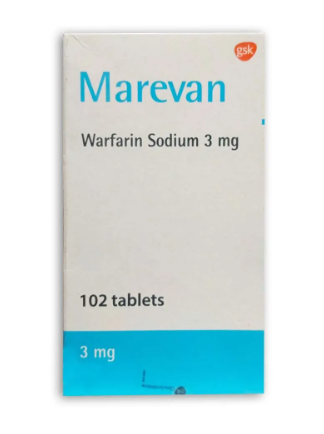
MAREVAN 3mg Price
Active Substance: Warfarin sodium.
Overview
Welcome to Dwaey, specifically on MAREVAN 3mg page.
This medicine contains an important and useful components, as it consists of
Warfarin sodiumis available in the market in concentration
Name
Warfarin Sodium
Precaution
Any condition where added risk of haemorrhage, necrosis and/or gangrene is present. Patient w/ heparin-induced thrombocytopenia, infectious diseases or disturbances of intestinal flora (e.g. sprue), indwelling catheters, moderate to severe HTN, vit C or K deficiency, known or suspected deficiency in protein C-mediated anticoagulant response, polycythemia vera, vasculitis, DM. Moderate to severe hepatic or renal impairment. Elderly. Lactation. Patient Counselling Eat a balanced diet w/ a constant amount of vit K. Avoid ingestion of large quantities of certain foods that contain a large amount of vit K (e.g. leafy green vegetables, certain vegetable oils), drastic changes in diet and activities or sports that could cause traumatic injury. Monitoring Parameters Monitor prothrombin time, haematocrit, INR (frequency varies depending on INR stability); may consider genotyping of CYP2C9 and VKORC1 prior to initiation of therapy, if available. Lactation: Not excreted in breast milk as reported in limited published study (AAP Committee states compatible with nursing); because of potential for serious adverse reactions, including bleeding in breastfed infant, consider developmental and health benefits of breastfeeding along with mother’s clinical need for therapy; monitor breastfeeding infants for bruising or bleeding
Indication
Venous thromboembolism, Stroke prevention, Deep vein thrombosis
Contra indication
Patient w/ haemorrhagic tendencies or blood dyscrasias, recent or contemplated surgery of the CNS or eye, those undergoing traumatic surgery resulting in large open surfaces, overt bleeding or active ulceration involving the GI, genitourinary or resp tract, cerebrovascular haemorrhage, cerebral aneurysms, dissecting aorta, pericarditis and pericardial effusions, bacterial endocarditis, threatened abortion, eclampsia, pre-eclampsia, malignant HTN. Unsupervised patients w/ conditions associated w/ potential high level of non-compliance, spinal puncture and other diagnostic or therapeutic procedures w/ potential for uncontrolled bleeding, major regional or lumbar block anaesth. Concomitant use w/ fibrinolytic drugs (e.g. streptokinase, alteplase). Pregnancy.
Side Effect
Hemorrhage is the principal adverse effect of oral anticoagulants. Jaundice, hepatic dysfunction, vasculitis, pancreatitis, nausea, vomiting, diarrhoea, taste perversion, abdominal pain, flatulence, bloating, rash, purpura, erythematous swollen skin patches leading to ecchymosis, pruritus, alopecia, purple discolouration of toes due to cholesterol embolisation, tracheal or tracheobronchial calcification, fever, chills. Unexplained drop in haematocrit, decreased Hb. Rarely, hypersensitivity reactions. Potentially Fatal: Haemorrhage from almost any organ of the body w/ the consequent effects of haematomas as well as anaemia, tissue necrosis and/or gangrene of skin or other tissues w/ SC infarction.
Pregnancy Category ID
5
Mode of Action
Warfarin inhibits synthesis of vit K-dependent coagulation factors VII, IX, X and II and anticoagulant protein C and its cofactor protein S. No effects on established thrombus but further extension of the clot can be prevented. Secondary embolic phenomena are avoided.
Interaction
Cholestatic hepatitis may occur when taken concomitantly w/ ticlopidine. Increased risk of bleeding w/ other anticoagulants (e.g. argatroban, dabigatran, heparin), antiplatelet agents (e.g. aspirin, cilostazol, clopidogrel), NSAIDs (e.g. celecoxib, diclofenac, ibuprofen), serotonin reuptake inhibitors (e.g. citalopram, paroxetine, venlafaxine). Increased INR w/ CYP2C9 (e.g. amiodarone, capecitabine, cotrimoxazole), CYP1A2 (e.g. aciclovir, allopurinol, ciprofloxacin) and CYP3A4 (e.g. alprazolam, amlodipine, atorvastatin) inhibitors. Decreased INR w/ CYP2C9, CYP1A2 and CYP3A4 inducers. Potentially Fatal: Increased risk of bleeding w/ fibrinolytic drugs (e.g. streptokinase and alteplase).
Pregnancy Category Note
Information not available
Adult Dose
Child Dose
Renal Dose
Administration
